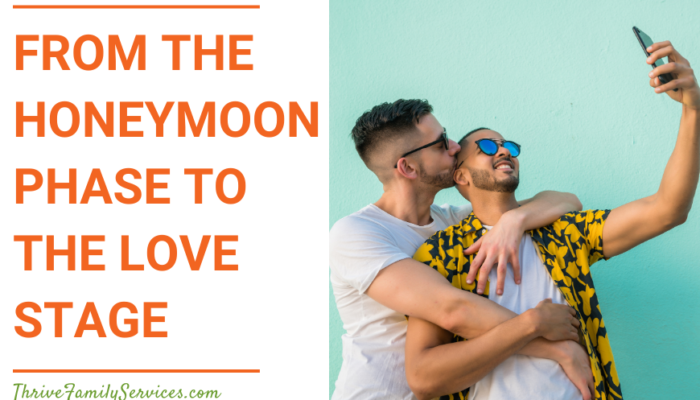You know that exciting and passionate time in the beginning of a relationship called “the Honeymoon Phase?”
They are always on your mind. You can’t find anything wrong with them! They seem to be absolutely perfect.
Even seeing an incoming text from the other person can make your heart skip a beat. Nothing else seems to matter when you’re with them. The closeness and excitement of learning things about your special new person can easily consume you.
Eventually, the Honeymoon Phase starts to fade. Maybe you even worry about it ending, or maybe you have even ended some of your relationships at that point because it’s not as fun.
It doesn’t have to be scary or unsatisfying when your relationship finishes the Honeymoon Phase. In fact, secure relationships can progress to the truly satisfying and much longer-lasting Love Stage.
So, what is the Honeymoon Phase and why doesn’t it last?
Will our relationship reach the “Love Stage“? First, let’s start with understanding the good reason the Honeymoon Phase happens in the first place.
The Honeymoon Phase
The need for love and connection with other humans is wired into our brains. We need connection for survival, and we crave it when we haven’t been around other people in a while.
Our universal need for closeness starts at birth, and never goes away, regardless of age.
Think about solitary confinement, for example, or babies left untended aside from food and shelter. We just simply fail to thrive without connection with others.
But why do we feel crazy in love during the Honeymoon Phase especially, and then it starts to feel, well, different over time?
Explosion of brain chemicals
First, tiny little chemicals in our bodies called “hormones” surge through the pleasure center of our brains during the Honeymoon Phase. These include dopamine, adrenaline and norepinephrine if you want to get fancy.
These “love hormones” live in our brains and go crazy whenever we think we might have found our person – if we find out that the person likes us back, the love hormones go even crazier!
We can’t stop smiling, and we just want more and more of that person because it just feels so good to see them.
In reality, love comes from our brains – not our hearts.
This reaction is a part of being human. If these hormones didn’t exist, it would be very difficult to figure out who we can make long-lasting connections with. After all, our love hormones don’t go crazy for just anyone walking down the street.
Despite how fun and enjoyable the Honeymoon Phase is, there is a good reason why it has to end.
Our brains cannot keep making these high levels of hormones all of the time, so eventually, they slow down and we transition into other phases of our relationships.
The wind down of the “Honeymoon Phase” hormones begins at two points:
- Either you or the other person decides to end the relationship, so your brain is forced to slow the production of these love hormones.
- Our brains recognize that this person may not be going anywhere, so they start to settle down. At this point, we are able to see the other person for who they really are, and we can determine if we are actually compatible with each other.
So, the end of the Honeymoon Phase in a lasting relationship doesn’t mean that we can’t still be with that person. It’s actually the opposite!
The end of the Honeymoon phase begins the best phase for deciding more realistically whether you want to stay with this person.
When the Honeymoon Phase ends, we get the chance to build trust and commitment with our partner. And it just so happens that trust and commitment are the main ingredients in any successful long-term relationship.
Honeymoon Phase to Trust-Building
If the Honeymoon Phase is the first part of a relationship, then Trust-Building would be the essential second part.
There are four things that we look for from our partners during this phase:
- Do they tell me the truth?
- Do they keep their promises to me?
- Will they have my back when I am counting on them?
- Do they have my best interests in mind?
Since human beings are not perfect, it is good news to know that our brains don’t expect perfection during this phase. Each partner will break the other person’s trust at some point in the relationship.
The main thing that we are looking for during this phase is the other person’s intentions. If we think they are looking out for us and genuinely want to make us happy, we start to trust them. This can be a slow process, but it is so important.
When trust is betrayed, the couple can choose to repair the trust or end the relationship. Trust can be broken in a variety of ways, including small actions, like not remembering a fact about the other person, or through big actions, like an on-going affair.
The trust building stage is the end of some relationships. The more the love hormones wear off, the easier it is to become annoyed, angry, or detached from the other person when inevitable ruptures happen.
However, if a couple is able to prove to each other that they will have each other’s backs – even after mistakes are made – they can progress into the final stage.
The Commitment and Love Stage
In the Commitment and Love Stage, couples decide if they are ready to commit to one another for the long-haul. Deep Love is created when the couple knows they will stick together, no matter what.
The couple figures out what works for them, and they continue to work together as a team.
The couple tackles a variety of life events together and proves over and over again that they are committed.
The Commitment and Love Stage is where you find your lifelong partner and friend.
You know you can count on each other no matter what, and there is nothing quite like that feeling. However, if this phase is not completed, the couple might drift apart, unhappy that their partner could not provide what was needed.
In other words, the key reason the honeymoon phase has to end is this:
The relationship cannot survive without trust and commitment, and trust and commitment cannot grow unless the love hormones fade out.
This doesn’t mean that people who are together for a long time don’t still get surges of love hormones.
They absolutely do, and you can look forward to that too. It’s just that those love hormones begin to change.
That’s right, you begin to have, and can continue to have a different set of hormones – the “Love Hormones” called Oxytocin and Vasopressin.
The good news is, we now know what couples need to make those Love Hormones – secure attachment.
Secure attachment occurs in a relationship that you nurture, that feels secure, and where you know you are loved and regularly show it to each other.
This is a phase where you can feel comfortable with yourself and with your partner.
Many people might think that their committed, trusting relationship of the Love Stage is even better than the Honeymoon Phase!
And isn’t that exactly what humans want in the first place? We’re all just looking for human connection, someone to love us, and to know they are there for us when we really need them.
No matter what stage your relationship is in, our experienced Greenwood Village couples therapists are here to support you in navigating these phases. Contact us at 303-513-8975, X1, or schedule online today:
This blog post was brought to you by sexual intimacy and Denver couples therapy specialist Emma Abel, M.Ed, Ed.S., MFTC




